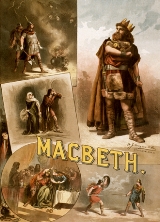
about a regicide
and its aftermath. It is Shakespeare's shortest tragedy
and is believed to have been written sometime between 1603 and 1607. The earliest account of a performance of what was probably Shakespeare's play is April 1611, when Simon Forman
recorded seeing such a play at the Globe Theatre
. It was first published in the Folio of 1623
, possibly from a prompt book
.
Shakespeare's source for the tragedy are the accounts of King Macbeth of Scotland
, Macduff, and Duncan
in Holinshed's Chronicles
(1587), a history of England, Scotland and Ireland familiar to Shakespeare and his contemporaries.
First Witch: When shall we three meet againIn thunder, lightning, or in rain?Second Witch: When the hurlyburly's done,When the battle's lost and won.![]()
Fair is foul, and foul is fair;Hover through the fog and filthy air.![]()
The merciless Macdonwald(Worthy to be a rebel, — for, to that,The multiplying villainies of natureDo swarm upon him) from the Western IslesOf kerns and gallowglasses is supplied;And Fortune, on his damned quarrel smiling,Showed like a rebel's whore: but all's too weak:For brave Macbeth (well he deserves that name)Disdaining Fortune, with his brandish'd steel,Which smoked with bloody execution,Like valour's minion,Carv'd out his passage.![]()
A sailor's wife had chestnuts in her lap,And munched, and munched, and munched:Give me, quoth I:Aroint thee, witch! the rump-fed ronyon cries.![]()
Sleep shall neither night nor dayHang upon his pent-house lid.![]()
So foul and fair a day I have not seen.![]()
If you can look into the seeds of time,And say which grain will grow, and which will not,Speak.![]()
The earth hath bubbles, as water has,And these are of them.![]()
Or have we eaten on the insane rootThat takes the reason prisoner?![]()

